Iranian Political Prisoner Begins Hunger Strike Against Repression
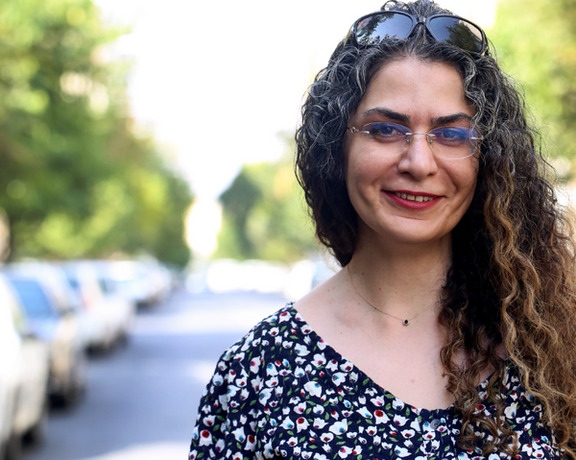
Bahareh Hedayat, an Iranian political prisoner in Evin Prison, has gone on hunger strike to protest repression and the death of another prisoner Javad Rouhi.

Bahareh Hedayat, an Iranian political prisoner in Evin Prison, has gone on hunger strike to protest repression and the death of another prisoner Javad Rouhi.
Javad Rouhi, a young Iranian protester who was one of the icons of the Women, Life, Freedom movement died in prison on Thursday.
Hedayat’s act coincides with the approaching anniversary of the Iranian uprising in September 2022 after Mahsa Amini died in hijab police custody.
In a poignant letter received by Iran International, Hedayat laments the Iranian government's efforts to normalize the loss of countless young lives.
In her statement, Hedayat articulates her motives: "I, in obedience to my conscience and in its defense, protest against the tragic death of Javad Rouhi in prison and express my support for the year-long, unyielding resistance of women in my country for freedom. I hereby declare my hunger strike, commencing from Friday evening. May this humble contribution serve the cause of freedom for Iran, a nation weary of tyranny."
Furthermore, Hedayat underscores the government's attempts to manipulate and distort the collective conscience, employing tactics that include the spilling the blood of the youth, suppression of university students, dismantling of academic institutions, and subjecting grieving families to relentless persecution.
Hedayat further condemns the accusations of collaboration with foreign governments against Niloufar Hamedi and Elaheh Mohammadi, two imprisoned journalists who first reported Mahsa Amini's death.
Hedayat, a dedicated activist, played a crucial role in the One Million Signatures campaign aimed at reforming discriminatory laws against women in Iran. Throughout her activism, she faced multiple arrests and periods of imprisonment.

A political figure with close ties to Iran's former President Mahmoud Ahmadinejad says he was the target of several assassination plots during the past two months.
Ahmad Alirezabeigi, a lawmaker from Tabriz, disclosed to the Didban Iran [Iran Monitor] website in Tehran that members of Ahmadinejad's office have consistently remained vigilant regarding potential attacks on the former President. However, the frequency of such threats has notably increased over the past two months.
On 27 August, Dolat-e Bahar, a Telegram channel close to Ahmadinejad reported that "Based on information from reliable sources, Mr. Ahmadinejad's office dispatched a letter to high-ranking military, police, and security commanders and officials, cautioning them about highly concerning developments and activities targeting him."
The report also stated that "Ahmadinejad has requested enhanced security measures for his protection and urged authorities to confront those responsible." Additionally, it highlights that "recent practical activities strongly suggest the existence of an organized plot to assassinate Dr. Ahmadinejad."
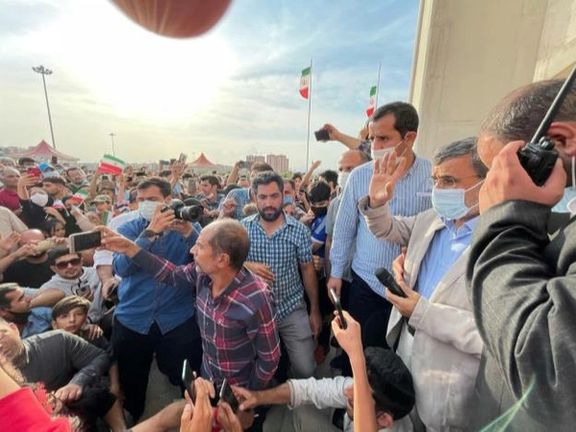
While Iranian media typically extensively cover any developments related to Ahmadinejad, it is noteworthy that they have seemingly overlooked this particular story. However, it remains uncertain whether the choice to disregard news regarding the attempted assassination of Ahmadinejad stemmed from higher levels within the Iranian political hierarchy.
Alirezabeigi told Didban Iran that the former President's office has presented evidence about the attempt on his life to the authorities.
It's likely that Ahmadinejad's office decided to publicize information about the alleged plots when they perceived a reluctance on the part of authorities to pursue the case further.
Alirezabeigi told Didban Iran that concerns about Ahmadinejad's safety have always been a priority for his office and its staff members, but recently they saw evidence that they thought should be communicated to the authorities.

Ahmadinejad has been consistently outspoken in his criticism of the Iranian government, particularly since the end of his presidential term. This criticism intensified notably from 2017 onward, coinciding with the onset of popular anti-government protests. While he frequently targeted the presidential administration and the Judiciary, especially when led by one of his arch-enemies, Sadeq Amoli Larijani, accusing them of corruption and inefficiency, he generally refrained from direct attacks on Supreme Leader Ali Khamenei.
Nonetheless, since 2019, Ahmadinejad also targeted Khamenei and his financial conglomerate. Since 2021, when likeminded Ebrahim Raisi took office as Iran's President, Ahmadinejad has been silent. His silence was so significant that Iranian media often wondered where he was during this period.
In one of the most recent reports of this kind, Khabar Online website said that Ahmadinejad has been recently holding meetings with his former aides Esfandiar Rahim Mashai and Hamid Baqaei.
Abbas Amirirfar, another aide of the former President said that Ahmadinejad and his aides have concluded that both the leading political factions -reformists and conservatives - have failed to solve Iran's problems and the nation expects Ahmadinejad to do something, Khabar Online said in its report.
There is a prevailing belief that the former president retains political support from numerous disadvantaged Iranians who appreciate his populist approach. They particularly value his track record of providing cash handouts and subsidies during his presidency.
As of now, the Iranian judiciary, police, and security agencies have not issued any response to this news. Nevertheless, Alirezabeigi suggests that officials should delve into specific details to gain further insights into the alleged plot. However, he did not provide any elaboration on the nature of these details.
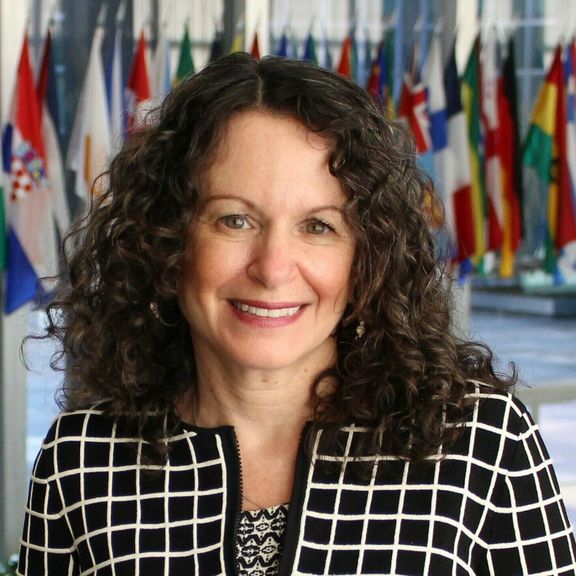
US Ambassador to the UN's Human Rights Council has condemned Iranian officials in UN leadership roles on the anniversary of Mahsa Amini's death.
Michèle Taylor's comments come as the Islamic Republic of Iran prepares to chair the UN Human Rights Council Social Forum in November.
Taylor stated, "As we approach the one-year anniversary of Mahsa Amini's tragic death, let me be clear: The US reasserts that Iran, with its appalling human rights record, has no place in leadership roles in the UN human rights ecosystem. The time for accountability is now."
Mahsa Amini, a 22-year-old Iranian woman received fatal wounds after the hijab police arrested her in Tehran and died three days later in the hospital. Her death led to months of antiregime protests during which security forces killed more than 500 civilians and arrested around 22,000.
The controversy surrounding Iran's involvement in UN leadership positions has been a contentious issue. In June, the Islamic Republic secured a leadership role as one of the vice-presidents of the UN General Assembly, drawing reactions from several member states and numerous activists.
In May, Iran's UN ambassador, Ali Bahraini, was appointed to chair the UN Human Rights Council 2023 Social Forum, leading to widespread anger and indignation. The forum is scheduled to take place in Geneva on November 2 and 3.
In response to these appointments, UN Watch, an independent human rights organization, launched a petition to UN Secretary-General Antonio Guterres, urging him to cancel the appointments. Additionally, UN Watch submitted a resolution to the UN to overturn the decision, gaining further attention and scrutiny regarding Iran's involvement in UN leadership positions.

Iran's leading Sunni cleric has criticized the regime for persecuting the religious minority, stating that the President failed to fulfill his campaign promises.
During his Friday prayer sermon, Mowlavi Abdolhamid criticized the regime for following a set of 'unwritten policies' that discriminate against the Sunni population in political and social spheres.
Sunnis make up at least 10 percent of Iran's 88 million population, and Zahedan, where thousands attend Abdolhamid’s Friday prayers every week, is one of the few Sunni-majority cities in a predominantly Shiite country.
He asserted that the authorities of the Islamic Republic intend to entrust the management of Sunni religious schools to Shia Muslims, a policy that has led to the imprisonment of several Sunni individuals who resisted this decision. Mowlavi Fat’hi-Mohammad Naghshbandi, the Friday prayer leader of the city of Rask, was arrested in August, sparking several days of demonstrations and a heavy security presence by regime agents in Sistan-Baluchestan province.
"The government can oversee religious school operations, but management should remain in the hands of Sunnis," he insisted. In areas where the government has imposed its favored Friday Prayer leaders, "the people no longer attend those mosques because they consider them state-owned."
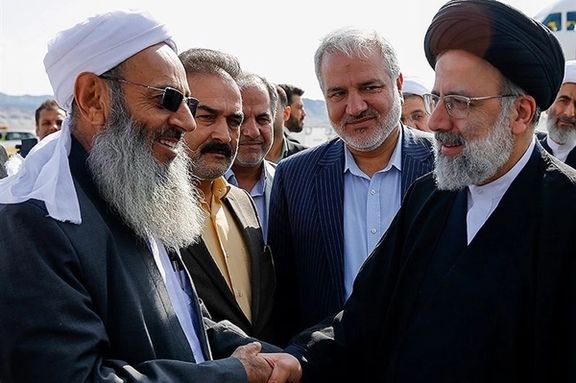
“Sunnis have been demanding justice and equality for the past 44 years, yet their demands have gone unmet,” Abdolhamid emphasized, noting that "during the Pahlavi era, Sunnis held senior positions in the army and the police, and the region was under the control of its people.”
“However, during the Islamic Republic, there hasn't been a single Sunni minister in the government,” he lamented, adding that Sunnis are excluded from managerial positions even in Sistan-Baluchestan province. “Meritocracy is absent in the Iranian government,” he asserted.
Criticizing inequalities in regions with substantial Sunni populations, he insisted, "In the appointment of managers in provinces such as Kordestan and Sistan-Baluchestan, there should be a balance between Sunnis and Shiites."
Abdolhamid also criticized the regime for turning every problem into a security issue, urging the authorities to allow minorities to practice their religion without fear of persecution. “Don't close Sunni mosques. Do not close places of worship for Jews, Christians, and other non-Islamic religions."
He also mentioned his meetings with President Ebrahim Raisi, stating that "Among the issues I raised were establishing relations with neighboring and Islamic countries, resolving livelihood and economic problems, and addressing the concerns of Sunnis and Iranian ethnic minorities."
Iran’s top Sunni leader added that the current administration has failed to fulfill any of its promises to the Sunnis made during the election campaigns, such as appointing Sunnis as governors, deputy ministers, or envoys to other countries. "You have approximately 180 ambassadors. If you let ten of them be Sunnis, nothing would happen. Sunnis are also an integral part of this land and your fellow citizens."
"Our most crucial demand is that the government does not differentiate between Shiites and Sunnis," he emphasized, stressing that the rights of all Iranian ethnic and religious minorities should be respected.
While Abdolhamid was delivering his sermon, the regime had shut down the internet in Zahedan and several other cities in the province, disrupting the live streaming of his speech on social media platforms.
After the Friday prayers, the people of Zahedan took to the streets in protest, chanting slogans demanding the release of detained Sunni Friday Prayer Leader Mowlavi Fat’hi-Mohammad Naghshbandi, along with other political prisoners.
These protests marked the forty-eighth consecutive weekly demonstrations in the province, occurring regularly since Bloody Friday on September 30, 2022, when security forces killed over 80 people, including women and children.
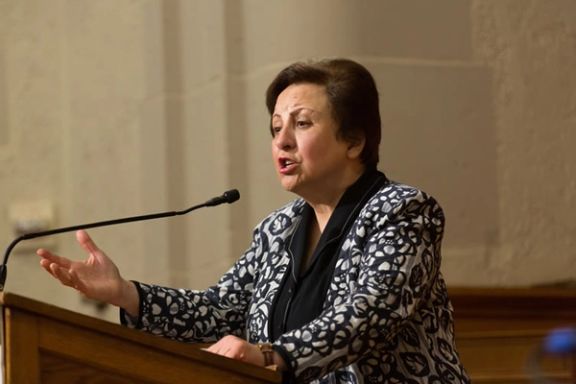
Nobel Peace Prize laureate Shirin Ebadi delivered a speech at the Nobel Peace Conference on Friday, drawing attention to the deteriorating human rights situation in Iran.
She also discussed the determination of the Iranian people to peacefully bring about change in the Islamic Republic reigme.
In her address, Ebadi highlighted the bravery of young Iranians, including teenage girls who risked their lives to protest on the streets. She emphasized that these actions signify a society awakened to the need for peaceful change and a desire to overthrow the current regime.
Ebadi also commemorated the tragic death of Mahsa Amini in detention, noting that citizens from hundreds of cities across Iran took to the streets to declare their rejection of the regime. She lamented that despite peaceful protests, the government responded with violence.
Addressing the international community, Ebadi urged hope and persistence in the face of dire circumstances, reminding everyone that many countries grapple with similar challenges. She expressed confidence that human rights defenders will contribute to improving these situations and called for continued efforts.
Ebadi brought attention to grim statistics, revealing that at least 80 of the victims in last year's nationwide protests were under 18 years old, emphasizing that this is only an estimate.
In closing, Shirin Ebadi promised the audience that this would be the last time she addresses the dire conditions in Iran, and her next discourse will focus on victories.
Shirin Ebadi, a vocal supporter of the Women, Life, Freedom protest movement, has been actively shedding light on the various facets of these protests and the violent response of the Iranian security forces.
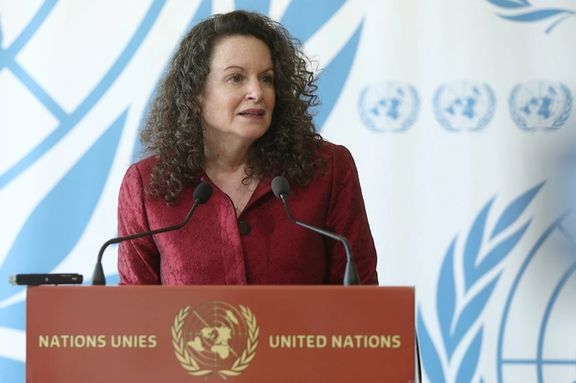
US ambassador to the UN's Human Rights Council condemns Iranian officials in UN leadership roles on the anniversary of Mahsa Amini's death.
Michèle Taylor's comments come as the Islamic Republic is set to chair the UN Human Rights Council Social Forum this November.
Taylor stated, "As we approach the one-year anniversary of Mahsa Amini's tragic death, let me be clear: The US reasserts that Iran, with its appalling human rights record, has no place in leadership roles within the UN human rights ecosystem. The time for accountability is now."
The controversy surrounding Iran's involvement in UN leadership positions has been a contentious issue. In June, the Islamic Republic secured a leadership role as one of the vice-presidents of the UN General Assembly, prompting reactions from several member states and numerous activists.
In May, Iran's UN ambassador, Ali Bahraini, was appointed to chair the UN Human Rights Council 2023 Social Forum, leading to widespread anger and indignation. The forum is scheduled to take place in Geneva on November 2nd and 3rd.
In response to these appointments, UN Watch, an independent human rights organization, launched a petition to UN Secretary-General Antonio Guterres, urging him to cancel the appointments. Additionally, UN Watch submitted a resolution to the UN aimed at overturning the decision, drawing further attention and scrutiny to Iran's involvement in UN leadership positions.






